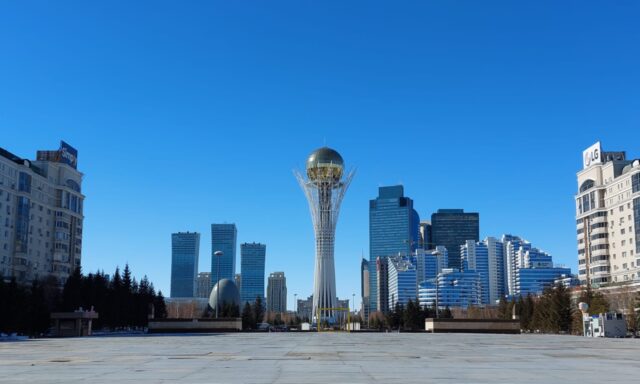Geopolitics of parliamentary elections in Kazakhstan

Geopolitical Report ISSN 2785-2598 Volume 29 Issue 5
Author: Silvia Boltuc
Upcoming parliamentary elections in Kazakhstan mark the last step for the country’s complete reformation based on modernisation and democratisation according to the new path promoted by Kazakh President Kassym-Jomart Tokayev.
On March 19th, 2023, Kazakhstan will hold early elections to the Majilis (lower house of Parliament) and Maslikhats (local legislative body) as part of the country’s reformation after the event in January 2022.
Kazakh parliamentary elections play a significant role in the country’s political life because they might confirm government leadership and people’s support and increase the stability and reliability of this Central Asian republic, which has attracted the interest of regional and foreign investors.
As a result of the constitutional reform adopted after the June 2022 referendum, now 70% of Majilis deputies will be elected from party lists and 30% from single-member districts. Elections to maslikhats in oblasts and cities of national importance will also be held under a mixed electoral system with a 50/50 ratio.
The new model of Majilis and maslikhats was adopted to fully protect voters’ national and regional interests and ensure a wide range of views in the representative power bodies.
Kazakhstan’s political scenario and reform process
In January 2022, Kazakhstan witnessed protests due to the rise of fuel prices, which flared up in the entire country, forcing Kazakh President Kassim-Jomart Toqayev to declare a state of emergency and request the support of the Collective Security Treaty Organisation (CSTO). After some days of tension and chaos, national authorities and security forces managed to stabilise the situation and quell the protests.
Since January 2022, Kazakhstan has embarked on a reform process to guarantee the country’s stability and, according to Kazakh official statements, increase domestic modernisation and democratisation. Indeed, Kazakh President Kassym-Jomart Tokayev has often stated his strategy to open a new stage of political development for the country, which lays the foundation for a “New and Just Kazakhstan”.
In March 2022, Tokayev proposed constitutional reforms aimed at changing the entire state model and form of government in the country by limiting the powers of the president, strengthening the role of Parliament, expanding the participation of citizens in political processes and further strengthening the protection of human rights.
Therefore, on June 5th, 2022, a national referendum on amending the Constitution of Kazakhstan was held. Around 77% of Kazakh voters decided to amend the country’s Constitution. International observers who attended the referendum were pleased with the results. They observed that every requirement of the electoral legislation and the country’s international obligations was successfully met. Kazakhstan’s Central Referendum Commission accredited 272 foreign observers representing 25 countries and 11 international organisations to make the referendum objective and transparent.
In addition, a Constitutional Court was established to defend the Constitution and check the president’s powers. The amendments decentralised Kazakhstan’s political structures by transferring power from the president to Parliament and ensuring more significant participation in decision-making by the executive.
Also, the Senate, the upper house of the Parliament, has been reformed, while the status and role of the Majilis have been increased. Indeed, the lower house of Parliament currently considers draft laws and adopts laws.
The system of electing deputies to the Majilis has been reformed: 70% of deputies will be selected on a proportional representation basis. In comparison, 30% will be elected through a majoritarian system. In addition, a mixed form of election to the maslikhats (local representative bodies) of oblasts and cities of national importance has been introduced.
The national reforms also removed the barriers to forming new political parties. Indeed, the registration threshold has been lowered from 20,000 to 5,000 people, a fourfold reduction (eight times in the past three years), and in regional branches, from 600 to 200 people.
On November 20th, 2022, the early presidential elections confirmed Tokayev’s leadership and opened a new mandate of seven years. Among six candidates, Tokayev won the presidential elections with 81% of the vote, securing his leadership and the people’s support for his strategy for a new Kazakhstan.
Conclusion
Kazakhstan is a key player in the Central Asian geopolitical arena. Due to its geographical position and natural resources, regional and international powers and foreign investors have demonstrated a considerable interest in the country. Indeed, Kazakhstan’s economy is the largest in Central Asia and larger than all other regional states combined.
Kazakhstan has attracted foreign investments and entrepreneurs thanks to its natural resources, including abundant natural minerals, hydrocarbons and rare earth metals. The Kazakh territory is also vital for Beijing’s Belt and Road Initiative and Moscow’s Eurasian Economic Union because the country might become an interconnector between European and Asian markets and increase regional and international trade.
Considering Kazakhstan’s economic potentiality, the country needs security to guarantee a stable market where foreign investors might operate without facing geopolitical risks, i.e. government change or local protest. In this context, upcoming parliamentary elections could represent the last step in the modernisation and stabilisation of the country desired by the Kazakh leadership in response to the perplexities and doubts that arose during and following the protests of January 2022.
Should the turnout at the polling stations be high and the ruling party Amanat wins, these elections could confirm the Kazakh citizens’ approval of the work of Tokayev and thus seal his leadership and government by giving them solid support for their strategy both in domestic and foreign policy.
During these days, SpecialEurasia Managing Director, Silvia Boltuc, is in Astana, the capital of Kazakhstan, to follow the parliamentary elections and meet official representatives to analyse Kazakh domestic and foreign policy, economy and society. For further information about Kazakhstan and the upcoming parliamentary elections, don’t hesitate to get in touch with SpecialEurasia at our e-mail address info@specialeurasia.com.
